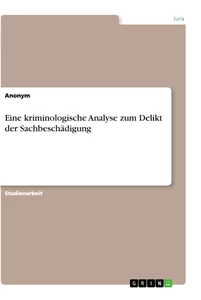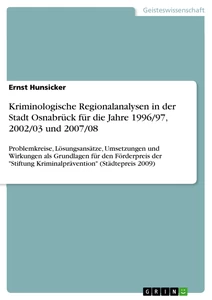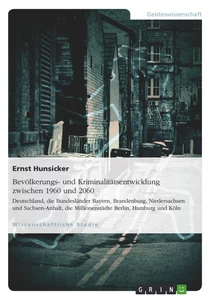
Criminology
The study on the causes of crime
For years, the series Tatort has been part of the German Sunday evening TV program. True crime has long been an integral part of the podcast charts worldwide and series such as Breaking Bad, Criminal Minds and Dexter enjoy great popularity. Crime and illegal activities have always been fascinating for us. So, it makes sense that people show a professional interest in this. Those who are less enthusiastic about the hunt for criminals and care more about prevention measures and backgrounds of criminal acts should take a closer look at a criminology degree program.
The study of criminology: what is it about?
“Criminology” is composed of the Latin word crimen (“crime”) and the Greek word lógos (“theorem; reason”) and means something like “the doctrine of crime”. It combines elements of law, sociology, psychiatry, pedagogy, psychology, economy, ethnology, anthropology, and business studies. A criminology degree program is, therefore, interdisciplinary.
Criminology not only tries to analyze and understand criminal behavior but also aims to prevent it. To this end, it always takes politics, society, and executive bodies into account when considering criminal offences.
Criminology is divided into the sub-areas of criminal etiology, criminal phenomenology, and victimology. Criminal etiology is the study of the causes of crime which in turn includes criminal biology (physical and genetic characteristics of delinquent people at the time of committing a crime), criminal sociology (crime as a social phenomenon), and criminal psychology (inner experience and behavior of people who violate laws).
Criminal phenomenology is the descriptive branch of criminology and deals with the manifestations of crime against an individual or social background. Among other things, the extent, nature, and circumstances of a crime are documented, and crime statistics are compiled and evaluated.
Victimology is concerned with the victims of crime. It investigates victim personality structures, victimization (the process in which someone becomes a victim of a crime), consequences of a crime for victims, relationship structures between perpetrators and victims, as well as the interaction between victims, social institutions, and the social environment.
Typical questions that criminologists deal with:
- How many crimes were registered by the police in Germany in year X in total?
- What percentage of perpetrators were under the influence of alcohol at the time of committing a crime?
- What is the most registered offence in year X?
- What is the clearance rate per offence?
- Is there a typical criminal?
- What triggers violence?
- What motivates criminals and terrorists?
- Do we need punishment at all?
- What is the point of prisons?
Requirements: How to become a criminologist?
In Germany, criminology can only be completed as a Master’s degree program. Therefore, interested students must have a Bachelor’s degree or a state examination. Both should have been acquired in a closely related field. Above all, law, social sciences, and psychology offer a good basis. Some law degrees focus on crime, however, there is no distinct focus on criminology.
You should also have an analytical mindset and strong communication skills. You should also be interested in mathematics and statistics, as well as in the analysis of the conditions of the social frameworks that promote criminal acts.
GRIN recommendation: Economics of criminology
Val Kauth discusses how and to what extent theories of crime, and in particular economic theories of crime, can help to reduce crime and the fear of crime. The paper elucidates the economic and social cost-dimensions of crime and introduces Gary Becker’s theory as the pioneering work of economic criminology. The book also elaborates on theories of crime and the economic approach as well as an analysis of its distinctive advantages.
The book at GRIN: Economics of criminology
The structure of the degree program: What can you expect?
The Master’s program lasts two to four semesters. Overall, the course revolves around the questions of what crime is and how it can be controlled. One important aspect of this is the question of whether people are born criminals or to what extent they are made to be criminals.
Criminology is divided into three main areas, which are weighted differently depending on what university you choose. The criminology of criminal policy deals with the prevention, i.e. the prevention of criminal offences. By formulating recommendations for action, this discipline can also have a major influence on politics and legislation.
Critical criminology deals with aspects of social science. Control and criminalization processes are addressed. Additionally, the causes for an individual’s criminal career are located within their living conditions and their experiences of social inequalities.
Applied criminology focuses on individual cases and can influence the administration of criminal justice. It includes topics such as criminological assessments and intervention planning.
Most degree programs consider violence research, politics, economics, police science, empiricism, victimology, and, of course, fundamental disciplines such as sociology and psychology or psychiatry.
Course contents
Violence research
- Which social, political and economic constellations promote violence?
Economy
- especially white-collar crime
Law
- prison law, forensic medicine
Victimology
- Why does someone become a victim? What are the consequences of crime for the victims?
Politics
- especially international security policy
Sociology
- Which social, political and economic constellations promote violence?
Police Science
- the history of the police, possibilities for action
Empiricism
- methodical-systematic collection of data
Psychology/Psychiatry
- Criminal Psychology
Differentiation from related fields of study
Thanks to the popularity of criminology in media, people now have certain associations and expectations that the study of criminology cannot meet. Especially regarding the following courses of study, a distinction is important:
Criminalistics
Criminology and criminalistics should not be confused. Criminalistics is the doctrine of the means and methods of fighting crime. Criminalists deal with individual cases, try to solve individual crimes, and find individual perpetrators. Thus, criminalistics are about solving crimes and not about determining the causes of criminal behavior. This is what criminology deals with. It is designed to make generally valid statements on the basis of such individual cases. It is interested in determining social laws. Crime scenes remain untouched by criminologists, nor are serial killers interrogated. Instead, statistics are calculated, files are analyzed and prevention measures are worked out.
Legal Psychology
Although the study of forensic psychology is also an interdisciplinary degree program and also deals with criminology, it primarily deals with psychological aspects of legal issues. Legal psychology includes forensic psychology, criminal psychology, and the psychology of the application of law. Legal psychologists assess, for example, the credibility of witnesses or the guiltiness of defendants in court. So far, this degree program is only available as a Master’s degree in Germany, and you must have a Bachelor’s degree in Psychology.
Forensic science
A distinction must also be made between criminology and forensics. The latter applies scientific methods to provide evidence that can be used for criminal investigations and to convict a perpetrator. Pieces of evidence are examined for biological evidence and prepared for use in court. Forensics deal with corpses, so this profession is certainly not for the faint of heart. In addition to disciplines such as law and psychology, which are also taught in criminology studies, the forensics program includes the basics of biology, physics and chemistry.
Locations: Where to study criminology?
In Germany, the Master’s program in criminology is currently offered at universities in Hamburg, Regensburg, and Bochum.
On the one hand, the University of Hamburg offers the popular course of study “International Criminology”, which focuses on social dynamics, for example, in prisons. As the name suggests, the degree program is oriented toward international debates and global issues.
On the other hand, the university also offers the part-time continued education Master’s program “Criminology”, for which, however, tuition fees totaling 3,370€ plus the semester fee are charged, and professional experience is required.
The University of Regensburg offers the “M.A. Criminology and Violence Research”. This deals with the causes, manifestations, and consequences of criminal offences. In addition to criminological theories, current findings in violence and aggression research are also conveyed here. The admission process involves an aptitude test, and you must have completed your preceding university degree with a grade of 2.5 or 5.5 points in law.
The part-time degree program in “Criminology, Criminalistics and Police Science” can be completed at the Ruhr-Universität Bochum. Students have the opportunity to choose between the elective areas of criminology and criminalistics. Apart from this, Bochum offers specializations in the areas of prevention, police science as well as sociology, and social research. In addition to a completed (technical) university degree, professional experience of at least one year is required for the application.
Moreover, there is the option of distance learning, however, the offer is also very limited. Above all, it is worth taking a look at the programs of “The Open University“.
Abroad, the number of criminology courses is much larger. There are also Bachelor’s degree programs in the field of criminology in many countries. In particular, the variety of courses in the USA and the United Kingdom stands out. However, very high tuition fees are to be expected there and so a longer stay is out of the question for many students. During the Bachelor’s degree, however, you can still benefit from the offer as part of a semester abroad. In addition, the acquired previous knowledge facilitates access to the Master’s programs in Germany.
GRIN recommendation: Diving deeper
African culture is central to its crime and punishment equation. Many criminological ideas developed and manifested in African society, yet criminological ideas are often credited as western creations. This denies African individuals of a well-deserved acknowledgment of their contributions to criminological ideas. In this paper, Joel Odili sets out to look at the African society before the influx of imperial powers, how their crime and punishment equation emerged, and how it was implemented in the society.
The book at GRIN: Criminological Thoughts and the African Contribution to its Development
After graduation
After graduation, of course, the first question arises as to where to work. Fortunately, the need for criminologists in a wide variety of fields is constantly growing, so the choice of job offers is large and versatile.
What jobs are there?
Professional fields of action arise wherever work areas are associated with the topic of crime. Jobs can be found at the Federal Criminal Police Office, in prisons and police authorities, but also at universities and scientific (research) institutes or in law firms. For example, employment in probation, court or juvenile court assistance is also conceivable. You can also work for the Federal Intelligence Service, in journalism, or in social work facilities. Leading positions in justice, home affairs and social administration can also be taken over. There is now also an increased need for criminologists in medicine and in a wide variety of companies. In addition, you can pursue a freelance activity and, for example, work as an expert on criminological topics.
Salary: How much do you earn with a Master’s degree?
Most graduates of criminology studies begin their careers in the public sector. The earnings are therefore based on the local collective agreement. A starting salary of between 3900 € and 4500 € gross per month can be expected. Those who also enjoy civil servant status have hardly any contributions thanks to the freedom from social security and benefit from pension obligations and non-terminability.
In collective agreements, criminologists are usually classified between pay groups 13 and 14, the salary is therefore calculated according to professional experience and the scope of tasks. Within the experience levels, you can also work your way up later and accordingly get a salary of about 5200 € gross per month.
A job in research or at a university is also conceivable at the beginning. The salary then usually depends on the negotiating skills of the respective criminologist, on previous experience and on the responsibility associated with the position in question. Accordingly, the salary in this field varies greatly and can initially be around 2900€ but can just as easily be 4000€ gross per month.
Through further education, additional thematically appropriate Master’s degrees, or, above all, a doctorate, the salary can also continue to rise. Top earners expect a monthly salary of 5800€ gross.
Reasons not to study criminology
No question, with a criminology degree you are quickly the center of every party – it sounds exciting and most people immediately think of CSI and their favorite thriller. But caution is advised here:
If you are hoping for spectacular criminal hunts and bloody crime scenes later, you should definitely look elsewhere.
The profilers of the future are better off in the course of study in forensic psychology described in more detail above but should be aware that the activity in Germany usually looks much less spectacular than shown in many series. If you like television pathologists, a study of (legal) medicine or the above-mentioned forensics is much more appropriate.
Likewise, with a criminology degree, you are far from qualified for police service. Although there are some police officers who are also criminologists, they are primarily criminalists. If you want to work in the police service, it is best to inquire with the local police about the recruitment procedures, as the modalities differ depending on the federal state in Germany.
Finally, the passion for True Crime and Mind Hunter is a good basis and also a suitable incentive for taking a closer look at criminology degree programs – but if the interest in the topic does not go beyond an occasional watch marathon, the desire to study should be thoroughly reconsidered.
In any case, criminology is a very important and exciting course of study, which offers graduates a large selection of interesting professions with attractive salaries.
GRIN recommendation: A current example
In his paper, Christian Möller provides the reader with an insight into the two different subjects of White Collar Crime and Street Crime in Germany and draws a brief comparison between the two manifestations of crime. Therefore, he deals with the most important definitions of the term “economic crime”, describes the various types of it, and explains its resulting damages. He also takes a look at street crime and characterizes the victims, the resulting damage, and the consequences of the cases of street crime.
The book at GRIN: White Collar Crime and Street Crime in Germany. A Comparative Overview
Further criminological studies and examples
Sources
External sources
- https://www.heimarbeit.de/kriminologie-studium-voraussetzungen-studieninhalte-perspektiven/
- https://www.uni-hamburg.de/campuscenter/studienangebot/studiengang.html?1274172400
- https://www.uni-hamburg.de/campuscenter/studienangebot/studiengang.html?1110292559
- https://www.uni-regensburg.de/studium/studienangebot/studiengaenge-a-z/kriminologie-gewaltforschung-ma/index.html
- https://www.makrim.de/
- https://www.karista.de/berufe/kriminologe/gehalt/
- https://criminologia.de/2014/06/drei-gruende-nicht-kriminologie-zu-studieren/

Students
GRIN is your partner for your studies! Research our wide range of topics and easily earn money with your term paper and final theses.

Publish your thesis
At GRIN, you can publish your final assignment for free. It is easy, quick and free of costs. Share your knowledge and make money off of it.








